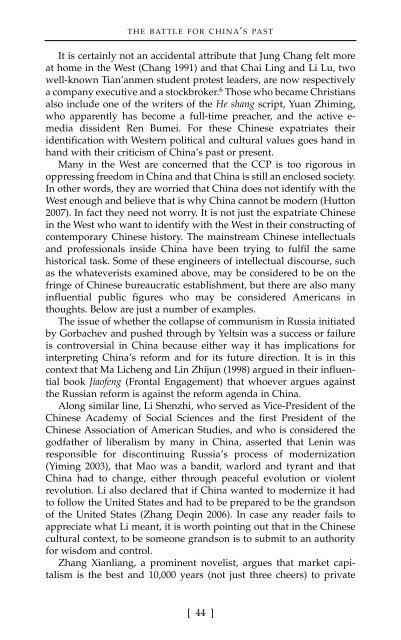Battle for China's Past : Mao and the Cultural Revolution
Battle for China's Past : Mao and the Cultural Revolution
Battle for China's Past : Mao and the Cultural Revolution
You also want an ePaper? Increase the reach of your titles
YUMPU automatically turns print PDFs into web optimized ePapers that Google loves.
THE BATTLE FOR CHINA’ S PAST<br />
It is certainly not an accidental attribute that Jung Chang felt more<br />
at home in <strong>the</strong> West (Chang 1991) <strong>and</strong> that Chai Ling <strong>and</strong> Li Lu, two<br />
well-known Tian’anmen student protest leaders, are now respectively<br />
a company executive <strong>and</strong> a stockbroker. 6 Those who became Christians<br />
also include one of <strong>the</strong> writers of <strong>the</strong> He shang script, Yuan Zhiming,<br />
who apparently has become a full-time preacher, <strong>and</strong> <strong>the</strong> active emedia<br />
dissident Ren Bumei. For <strong>the</strong>se Chinese expatriates <strong>the</strong>ir<br />
identification with Western political <strong>and</strong> cultural values goes h<strong>and</strong> in<br />
h<strong>and</strong> with <strong>the</strong>ir criticism of China’s past or present.<br />
Many in <strong>the</strong> West are concerned that <strong>the</strong> CCP is too rigorous in<br />
oppressing freedom in China <strong>and</strong> that China is still an enclosed society.<br />
In o<strong>the</strong>r words, <strong>the</strong>y are worried that China does not identify with <strong>the</strong><br />
West enough <strong>and</strong> believe that is why China cannot be modern (Hutton<br />
2007). In fact <strong>the</strong>y need not worry. It is not just <strong>the</strong> expatriate Chinese<br />
in <strong>the</strong> West who want to identify with <strong>the</strong> West in <strong>the</strong>ir constructing of<br />
contemporary Chinese history. The mainstream Chinese intellectuals<br />
<strong>and</strong> professionals inside China have been trying to fulfil <strong>the</strong> same<br />
historical task. Some of <strong>the</strong>se engineers of intellectual discourse, such<br />
as <strong>the</strong> whateverists examined above, may be considered to be on <strong>the</strong><br />
fringe of Chinese bureaucratic establishment, but <strong>the</strong>re are also many<br />
influential public figures who may be considered Americans in<br />
thoughts. Below are just a number of examples.<br />
The issue of whe<strong>the</strong>r <strong>the</strong> collapse of communism in Russia initiated<br />
by Gorbachev <strong>and</strong> pushed through by Yeltsin was a success or failure<br />
is controversial in China because ei<strong>the</strong>r way it has implications <strong>for</strong><br />
interpreting China’s re<strong>for</strong>m <strong>and</strong> <strong>for</strong> its future direction. It is in this<br />
context that Ma Licheng <strong>and</strong> Lin Zhijun (1998) argued in <strong>the</strong>ir influential<br />
book Jiaofeng (Frontal Engagement) that whoever argues against<br />
<strong>the</strong> Russian re<strong>for</strong>m is against <strong>the</strong> re<strong>for</strong>m agenda in China.<br />
Along similar line, Li Shenzhi, who served as Vice-President of <strong>the</strong><br />
Chinese Academy of Social Sciences <strong>and</strong> <strong>the</strong> first President of <strong>the</strong><br />
Chinese Association of American Studies, <strong>and</strong> who is considered <strong>the</strong><br />
godfa<strong>the</strong>r of liberalism by many in China, asserted that Lenin was<br />
responsible <strong>for</strong> discontinuing Russia’s process of modernization<br />
(Yiming 2003), that <strong>Mao</strong> was a b<strong>and</strong>it, warlord <strong>and</strong> tyrant <strong>and</strong> that<br />
China had to change, ei<strong>the</strong>r through peaceful evolution or violent<br />
revolution. Li also declared that if China wanted to modernize it had<br />
to follow <strong>the</strong> United States <strong>and</strong> had to be prepared to be <strong>the</strong> gr<strong>and</strong>son<br />
of <strong>the</strong> United States (Zhang Deqin 2006). In case any reader fails to<br />
appreciate what Li meant, it is worth pointing out that in <strong>the</strong> Chinese<br />
cultural context, to be someone gr<strong>and</strong>son is to submit to an authority<br />
<strong>for</strong> wisdom <strong>and</strong> control.<br />
Zhang Xianliang, a prominent novelist, argues that market capitalism<br />
is <strong>the</strong> best <strong>and</strong> 10,000 years (not just three cheers) to private<br />
[ 44 ]
















